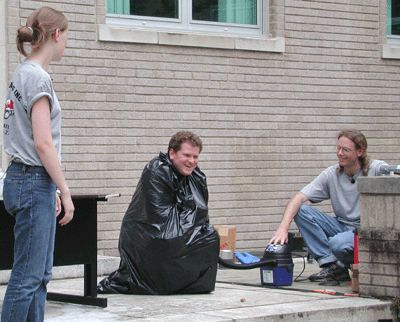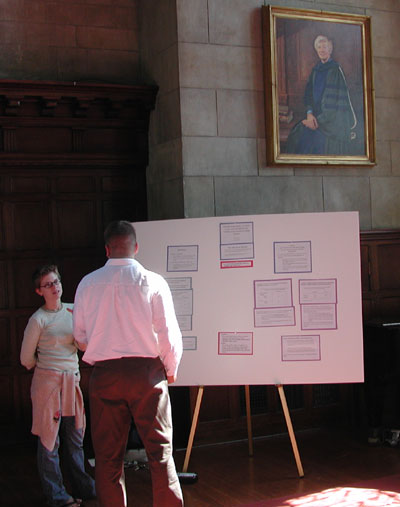|
From The
Plan For a New Century (submitted by the President to the Board
of Trustees, and approved 4 March 2000):
"We also propose to create a limited
number of "centers" to encourage innovation between and within existing
departments and programs. The hallmark of these interrelated centers
will be their flexibility, their ability to adapt to changing circumstances
... we need to create flexible ways to develop and maintain an innovative
edge in the extra-curricular life of the College and in the curriculum
itself. The proposed centers are designed to prompt ongoing change".
"The Center for Science in Society will catalyze and support explorations
of the many ways in which people seek to understand the natural
world and to use that understanding to support its continuing vitality
as well as that of human society. The Center will investigate connections
between scientific methods of inquiry and humanistic ones, and will
bring together the academic and the applied. It will foster hands-on,
exploratory and transdisciplinary approaches to teaching and research
... (and) facilitate the integration of academic learning with scientific
understanding in workplace and policy settings. The Center will
support existing ... programs and facilitate new collaborations
among faculty, staff, and students from the natural sciences, social
sciences, and humanities"
From Center for Science In Society: A Planning
Document (submitted to the President, 30 November 2000)
Objectives
- To support innovative approaches to education in the sciences
and in interdisciplinary areas, aimed at assuring both a high
level of broad sophistication in students anticipating careers
in the sciences, and a level of scientific literacy in all students
which is adequate to assure that they are informed and active
participants in a world increasingly affected by advances in scientific
knowledge and technological development. Central to this objective
is to further encourage the ongoing development of hands-on, exploratory,
and transdisciplinary teaching approaches, both in science and
across the curriculum.
- To support novel intellectual collaborations, among scientists
from different disciplines and between scientists and non-scientists,
aimed at usefully bringing together different perspectives on
issues and problems of practical importance, conceptual significance,
and/or broad societal concern.
- To support new projects aimed at bridging the gap between the
academic and the applied as they bear on larger social issues.
- To support an environment within which there is ongoing, meaningful,
and productive inquiry into the reciprocal relationships between
science/technology and broader human culture, and into the nature
of human understanding itself.
- To serve, for students/faculty/staff, as a source of continual
encouragement and support for trying out new things, as a valuable
counterbalance to the essential and itself valuable conservatism
of academic disciplinary structures.
Implementation
- The Center will create a community wide forum by scheduling
conferences, lectures, and colloquia related to Science in Society.
- The Center will support a changing set of faculty/student/staff
"working groups" around particular relevant
topics. These may involve objectives which are primarily research,
primarily educational, or both.
- The Center could support activities related to a reconception
of graduate education in the sciences.
- The Center will maintain a program of fellowships,
through which alumnae and other visitors, as well as College faculty/staff/students,
can be supported for varying periods of time to undertake work
based on their own interests which contributes to the objectives
of the Center.
- The Center will have a strong and continually evolving web presence.
|
After Six Years, October 2006
September 2003 ...
With steadily expanding engagement of undergraduates, graduate students, faculty, and staff, the Center is continuing to explore and evolve mechanisms to fulfill its objectives. The ongoing evolution of the center continues to be overseen by Paul Grobstein, Director, and a diverse Faculty Steering Committee.

Over the past several years, the Center has sponsored or co-sponsored visits to the campus by a wide variety of distinguished speakers (including Octavia Butler, George Lakoff, and Paul Ehrlich), supported longer term engagements by Center as well as Keck and Mellon Fellows, has evolved a weekly "Brown Bag" discussion series, has developed "working groups" and initiatives in several areas (including Mental Health, Language, and Emergent Systems), and has supported a variety of curricular innovations at precollege, college, and graduate levels. Central to these activities has been a continually evolving web presence, both providing information and resources and maintaining an interactive record of conversations and ideas supported by the Center.
 Continuing evolution ... During the upcoming year, the Center will add to its existing activities co-sponsorship of a campus-wide ongoing discussion of diversity and its significance. We hope also to further strengthen activities in several areas: the environment, science and public policy, and history/philosophy of science. In addition, we will be working to further enhance undergraduate and alumnae involvement both in the ongoing activities of the Center and in its organization and planning.
Continuing evolution ... During the upcoming year, the Center will add to its existing activities co-sponsorship of a campus-wide ongoing discussion of diversity and its significance. We hope also to further strengthen activities in several areas: the environment, science and public policy, and history/philosophy of science. In addition, we will be working to further enhance undergraduate and alumnae involvement both in the ongoing activities of the Center and in its organization and planning.
An open invitation ... to undergraduates, graduate students, faculty, staff, alumanae. The Center exists to encourage and support "new collaborations" that intersect science with other human activities, both academic and applied. Whatever successes it has emerges from the interest in and willingness of all members of the Bryn Mawr community to conceive and try out new ways of conceiving of their own activities and aspirations. Accordingly, all members of the commmunity are warmly encouraged not only to participate in existing Center programs but to suggest and help organize new directions for the Center to pursue. See Getting Involved.


|



